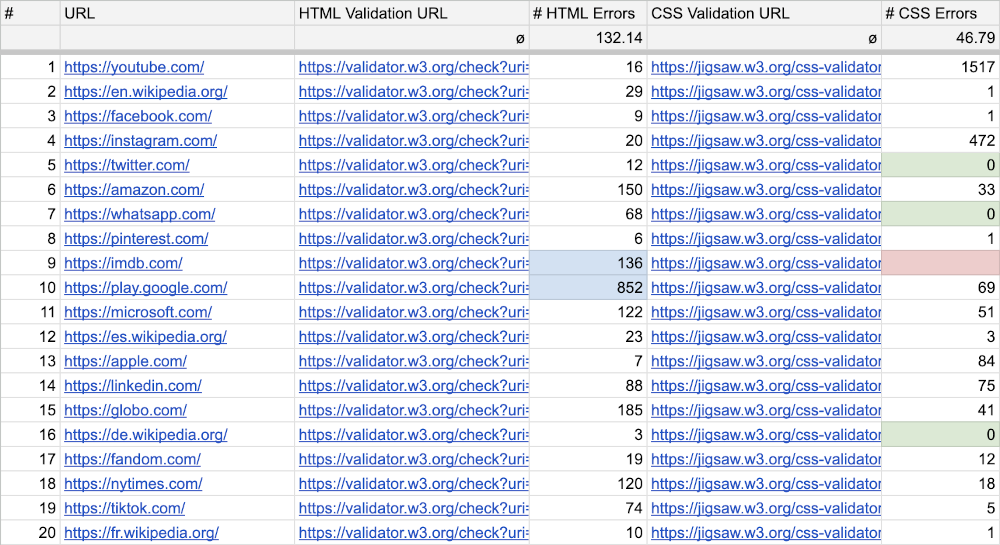2023: 0 of the Global Top 100 Websites Use Valid HTML
Published on October 31, 2023 (↻ March 9, 2024), filed under Web Development (RSS feed for all categories).
Let’s dive right in: Nothing changed compared to last year—none of the 100 most-visited websites globally uses HTML in full conformance with the HTML specification.
The following data gives an impression of precision that is greater than warranted. The point of this annual analysis is to check on full HTML conformance (absence of markup errors); that is, CSS conformance checks are a bonus, and the specific error counts don’t matter for the purpose of telling conformance or non-conformance, either. I’m providing the data for further study, and for comparability to previous years.
Analysis
After 2021 and 2022, I used the annual update of the Ahrefs Top 100 websites to check the homepages of these websites on HTML conformance.
For that purpose I took all the respective URLs, prepared HTML and CSS validation URLs, and documented the error counts of the 200 tests in a spreadsheet:
HTML Conformance in 2023
0 of the 100 websites have 0 HTML conformance errors.
3 (Adobe, Speedtest, and Spotify) were very close to conformance, with 1 error each. 14 more had a single-digit number of issues.
37 were far away from conformance with any specification (100 or more errors).
The average number of HTML errors is 132.14.
The HTML errors median is 62.
(The mode is 23.)
CSS Conformance in 2023
The W3C CSS validator needs updating. There appear to be many false positives (and a suspicion of false negatives), raising concern that the results aren’t practically useful anymore (perhaps not even for ballpark numbers). CSS conformance isn’t as critical as HTML conformance, but it’s important for us to have a reliable CSS validator.
12 of 94 tested websites have 0 CSS conformance errors. (6 websites could not be checked.)
34 were close to conformance, with a single-digit number of errors.
7 were far away (100 or more errors, with one site containing more than 1,000 errors).
The average number of CSS errors is 46.79.
The median is 10.5.
(The mode is 0.)
HTML and CSS Conformance over Time
We need to test more websites to make this significant, but given that this has been the third analysis, here is how error counts developed over the years:
| 2021 | 2022 | 2023 | |
|---|---|---|---|
| HTML | ø 125.22 errors | ø 125.63 errors → | ø 132.14 errors ↗ |
| 2 homepages without errors | 0 homepages without errors ↘ | 0 homepages without errors → | |
| CSS | ø 48.40 errors | ø 26.33 errors ↓ | ø 46.79 errors ↑ |
| 3 homepages without errors | 13 homepages without errors ↑ | 12 homepages without errors → |
Interpretation
I think the results speak for themselves.
Personally, I’m vocal about the usefulness of conformance—I think it’s foundational for our field, that it should be a hiring criterion, and that it could unite us to tackle other important challenges. (If you’re interested, I also run an ebook series—check out the latest edition—explaining and promoting valid, minimal HTML.)
While that’s me, even during the years of the Web Standards Project (1998–2013), our field has neither accepted this nor any other quality standard for its output.
We can use every developer to improve this—lead by example and ship valid code—, but going by the data, there’s no change in sight.
About Me

I’m Jens, and I’m an engineering lead and author. I’ve worked as a technical lead for companies like Google and as an engineering manager for companies like Miro, I’m close to W3C and WHATWG, and I write and review books for O’Reilly and Frontend Dogma.
With my current move to Spain, I’m open to a new remote frontend leadership position. Feel free to review and refer my CV or LinkedIn profile.
I love trying things, not only in web development, but also in other areas like philosophy. Here on meiert.com I share some of my views and experiences.
Read More
Maybe of interest to you, too:
- Next: Website Optimization Measures, Part XXI
- Previous: Existence and Experience
- More under Web Development
- More from 2023
- Most popular posts
Looking for a way to comment? Comments have been disabled, unfortunately.

Get a good look at web development? Try WebGlossary.info—and The Web Development Glossary 3K (2023). With explanations and definitions for thousands of terms of web development, web design, and related fields, building on Wikipedia as well as MDN Web Docs. Available at Apple Books, Kobo, Google Play Books, and Leanpub.

